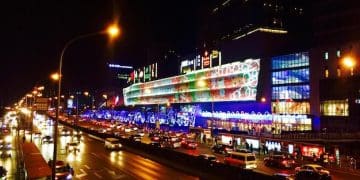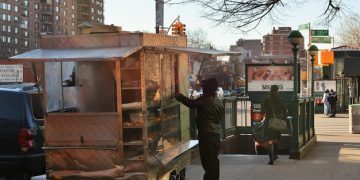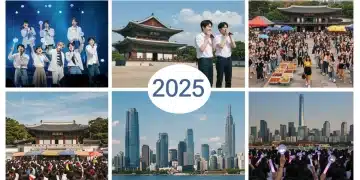Master Korean Phrases: US Travelers’ 2025 Survival Guide
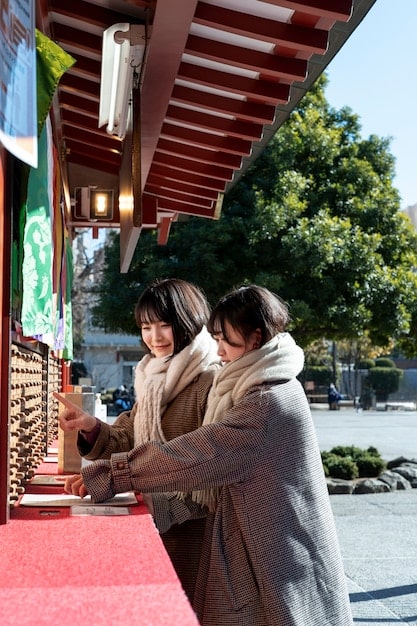
Mastering basic Korean phrases is essential for US travelers planning a trip in 2025, enhancing their travel experience and cultural immersion by facilitating smoother interactions and a deeper connection with the local community.
Planning a trip to South Korea in 2025? Mastering basic Korean phrases can significantly enhance your travel experience, allowing you to connect with locals and navigate the country with greater ease. This survival guide will equip you with essential phrases to make your journey unforgettable.
Why Learn Basic Korean Phrases for Your 2025 Trip?
Traveling to a new country is always exciting, but it can also be daunting if you don’t speak the local language. Learning a few basic phrases can make a world of difference.
Understanding and using Korean phrases shows respect for the local culture and opens doors to meaningful interactions. It can transform your trip from a touristy experience to an immersive cultural adventure.
Enhanced Communication
Knowing basic phrases allows you to communicate your needs effectively, whether it’s ordering food, asking for directions, or seeking assistance. This reduces frustration and enhances your overall experience.
Moreover, locals often appreciate the effort you make to speak their language, which can lead to warmer interactions and a more welcoming atmosphere.
Cultural Immersion
Language is deeply intertwined with culture. By learning Korean phrases, you gain a deeper understanding of Korean customs, values, and perspectives. This creates a richer, more meaningful travel experience.
Engaging with locals in their language allows you to move beyond tourist stereotypes and experience the genuine warmth and hospitality that South Korea has to offer.
- Breaking Down Language Barriers: Learn to bridge the gap and connect more effectively.
- Respect and Appreciation: Show your respect for Korean culture through language.
- Authentic Experiences: Unlock deeper cultural insights and authentic interactions.
In conclusion, learning basic Korean phrases before your trip in 2025 isn’t just about convenience; it’s about enriching your travel experience and fostering genuine connections with the Korean people and their culture.
Essential Greetings and Polite Expressions
Greetings and polite expressions are the foundation of any language. Knowing these phrases in Korean will help you start conversations on the right foot and show respect for local customs.
From simple hellos to expressions of gratitude, these phrases are essential for creating positive interactions and making a good impression.
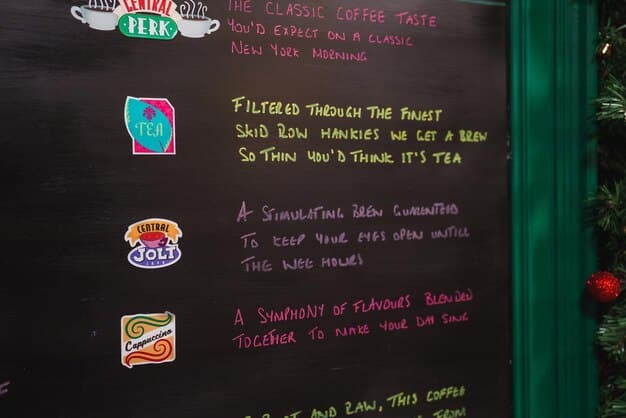
Basic Greetings
Start with the basics. Here are some essential Korean greetings you should know:
- 안녕하세요 (Annyeonghaseyo): Hello (formal)
- 안녕 (Annyeong): Hello (informal, to friends)
- 좋은 아침이에요 (Joeun achimieyo): Good morning
- 좋은 밤 되세요 (Joeun bam doeseyo): Good night
Using the appropriate level of formality is crucial in Korean culture. 안녕하세요 (Annyeonghaseyo) is a safe bet for most situations, while 안녕 (Annyeong) is best reserved for friends and close acquaintances.
Polite Expressions
Politeness is highly valued in Korean culture. Using polite expressions will demonstrate your respect and consideration for others.
- 감사합니다 (Gamsahamnida): Thank you (formal)
- 고맙습니다 (Gomapseumnida): Thank you (less formal)
- 천만에요 (Cheonmaneyo): You’re welcome
- 죄송합니다 (Joesonghamnida): I’m sorry
- 실례합니다 (Sillyehamnida): Excuse me
These phrases are invaluable in various situations, from thanking a shopkeeper to apologizing for bumping into someone on the street. Remember to use 감사합니다 (Gamsahamnida) or 고맙습니다 (Gomapseumnida) to express your gratitude appropriately.
In conclusion, mastering these essential greetings and polite expressions will not only facilitate smoother interactions but also demonstrate your respect for Korean culture, paving the way for a more enriching and rewarding travel experience.
Navigating Transportation with Key Phrases
Getting around in a new city can be challenging, especially if you don’t speak the local language. Knowing some key phrases for transportation will help you navigate with confidence.
Whether you’re taking the subway, riding a bus, or hailing a taxi, these phrases will make your journey smoother and less stressful.
Subway and Bus
Public transportation is an efficient way to explore South Korea. Here are some phrases you’ll find useful:
- [역] 어디에 있어요? ([Yeok] eodie isseoyo?): Where is [station]?
- [역]까지 어떻게 가요? ([Yeok]kkaji eotteoke gayo?): How do I get to [station]?
- 얼마예요? (Eolmayeyo?): How much is it?
- [역]에 가주세요. ([Yeok]e gajuseyo.): Please go to [station]. (for taxi)
When asking for directions, be sure to pronounce the station name clearly. Many Koreans are happy to assist, but clear communication is key.
Taxi
Taxis are readily available in most Korean cities. Here are some phrases to help you communicate with your driver:
- 여기 세워주세요. (Yeogi sewojuseyo.): Please stop here.
- [주소]로 가주세요. ([Juso]ro gajuseyo.): Please go to [address].
Having the address written down or saved on your phone can be helpful, especially if your pronunciation isn’t perfect. It’s also a good idea to confirm the fare before starting your journey.
In conclusion, being equipped with these key phrases will empower you to navigate South Korea’s transportation system with confidence, allowing you to explore the country’s diverse attractions without language-related stress.
Dining Out: Ordering Food and Drinks
Food is an integral part of Korean culture, and dining out is a common pastime. Knowing some basic phrases for ordering food and drinks will enhance your culinary experience.
From delicious street food to fine dining restaurants, these phrases will help you navigate menus, communicate your preferences, and enjoy the diverse flavors of Korean cuisine.
Ordering Food
Here are some essential phrases for ordering food in Korean:
- [음식 이름] 주세요. ([Eumsik ireum] juseyo.): Please give me [food name].
- 뭐가 맛있어요? (Mwoga masisseoyo?): What is delicious?
- 맵지 않게 해주세요. (Maepji anke haejuseyo.): Please make it not spicy.
Koreans take pride in their cuisine, so asking for recommendations can lead you to discover some hidden culinary gems. Don’t be afraid to try new dishes and explore the diverse flavors of Korean food.
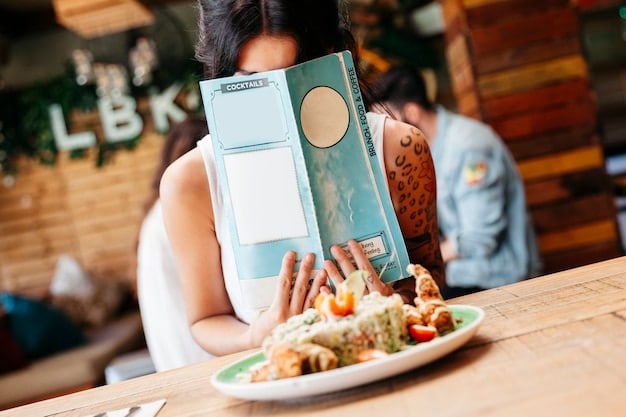
Ordering Drinks
Whether you’re ordering tea, coffee, or a local beverage, these phrases will come in handy:
- [음료 이름] 주세요. ([Eumnyo ireum] juseyo.): Please give me [drink name].
- 물 주세요. (Mul juseyo.): Please give me water.
- 맥주 한 병 주세요. (Maekju han byeong juseyo.): Please give me a bottle of beer.
Water is often served free of charge in Korean restaurants. However, don’t hesitate to use these phrases to order your preferred beverage and complement your meal.
By learning these phrases, you’ll not only be able to order your favorite dishes and drinks but also engage with restaurant staff, creating a more enjoyable and authentic dining experience. This small effort to communicate in Korean will be appreciated and can lead to memorable culinary adventures.
Shopping Essentials: Phrases for Bargaining and Asking Prices
Shopping in South Korea can be an exciting experience, with a wide range of products and unique souvenirs to discover. Knowing some basic phrases for bargaining and asking prices will help you get the best deals and navigate local markets with confidence.
From bustling street markets to modern shopping malls, these phrases will empower you to interact with vendors, negotiate prices, and make the most of your shopping adventures.
Asking Prices
Before making a purchase, it’s essential to know how to ask for the price. Here are some useful phrases:
- 이거 얼마예요? (Igeo eolmayeyo?): How much is this?
- 너무 비싸요. (Neomu bissayo.): It’s too expensive.
- 깎아 주세요. (Kkakka juseyo.): Please give me a discount.
In many traditional markets, bargaining is acceptable and even expected. However, it’s important to be respectful and polite during the negotiation process.
Making Purchases
Once you’ve agreed on a price, here are some phrases to help you complete your purchase:
- 네, 살게요. (Ne, salgeyo.): Yes, I’ll buy it.
- [금액] 원이에요. ([Geumaek] wonieyo.): It’s [amount] won.
- 여기 있어요. (Yeogi isseoyo.): Here it is.
Knowing these phrases will facilitate smoother transactions and prevent misunderstandings, ensuring a pleasant shopping experience. Remember to carry cash, as some smaller shops and markets may not accept credit cards.
Equipped with these shopping essentials, you’ll not only be able to find unique souvenirs and products but also engage in the local culture of bargaining. This will add a layer of fun and authenticity to your shopping experiences in South Korea.
Emergency Situations: Key Phrases for Safety
While it’s important to be prepared for emergencies, knowing some key phrases for safety can provide peace of mind during your travels.
From seeking medical assistance to reporting a crime, these phrases will help you communicate your needs and access the necessary help in critical situations.
Seeking Help
Here are some essential phrases for seeking assistance in an emergency:
- 도와주세요! (Dowajuseyo!): Help me!
- 경찰 불러주세요. (Gyeongchal bulleojuseyo.): Call the police.
- 구급차 불러주세요. (Gugeupcha bulleojuseyo.): Call an ambulance.
In any emergency situation, it’s crucial to remain calm and speak clearly. Providing as much information as possible will help authorities respond effectively.
Medical Assistance
If you require medical attention, here are some phrases to communicate your needs:
- 아파요. (Apayo.): I’m sick.
- [신체 부위]가 아파요. ([Sinche buwi]ga apayo.): My [body part] hurts.
- 병원에 가고 싶어요. (Byeongwone gago sipeoyo.): I want to go to the hospital.
It’s also a good idea to carry a card with your medical information, including any allergies or pre-existing conditions. This will help medical professionals provide you with the best possible care.
While it’s our hope that you won’t need to use these phrases, being prepared for emergencies is an essential aspect of responsible travel. Knowing these key phrases will empower you to seek help and communicate your needs effectively, ensuring your safety and well-being during your trip to South Korea.
| Key Phrase | Brief Description |
|---|---|
| 👋 안녕하세요 (Annyeonghaseyo) | Formal greeting: Hello. |
| 🙏 감사합니다 (Gamsahamnida) | Formal expression: Thank you. |
| ❓[역] 어디에 있어요? | Asking location: Where is [station]? |
| 🆘 도와주세요! (Dowajuseyo!) | Emergency call: Help me! |
Frequently Asked Questions (FAQs)
▼
Learning basic Korean phrases significantly enhances the travel experience by facilitating smoother interactions, demonstrating respect for the local culture, and unlocking deeper cultural insights, leading to a more authentic and rewarding trip.
▼
Essential greetings include “안녕하세요 (Annyeonghaseyo)” for hello in formal settings, “감사합니다 (Gamsahamnida)” for thank you, and “천만에요 (Cheonmaneyo)” for you’re welcome, ensuring polite and respectful interactions with locals.
▼
Knowing phrases like “[역] 어디에 있어요? ([Yeok] eodie isseoyo?)” for “Where is [station]?” and “[주소]로 가주세요. ([Juso]ro gajuseyo.)” for “Please go to [address]” can greatly simplify navigating public transport and taxis.
▼
Useful phrases include “[음식 이름] 주세요. ([Eumsik ireum] juseyo.)” for “Please give me [food name],” “뭐가 맛있어요? (Mwoga masisseoyo?)” for “What is delicious?” and “맵지 않게 해주세요. (Maepji anke haejuseyo.)” for “Please make it not spicy.”
▼
In case of an emergency, knowing “도와주세요! (Dowajuseyo!)” for “Help me!” and “경찰 불러주세요. (Gyeongchal bulleojuseyo.)” for “Call the police” are critical for seeking immediate assistance.
Conclusion
Mastering basic Korean phrases is an invaluable asset for US travelers planning a trip in 2025. By equipping yourself with these essential expressions, you’ll not only navigate South Korea with greater ease but also unlock deeper cultural insights and create more meaningful connections with the local community, making your journey truly unforgettable.
